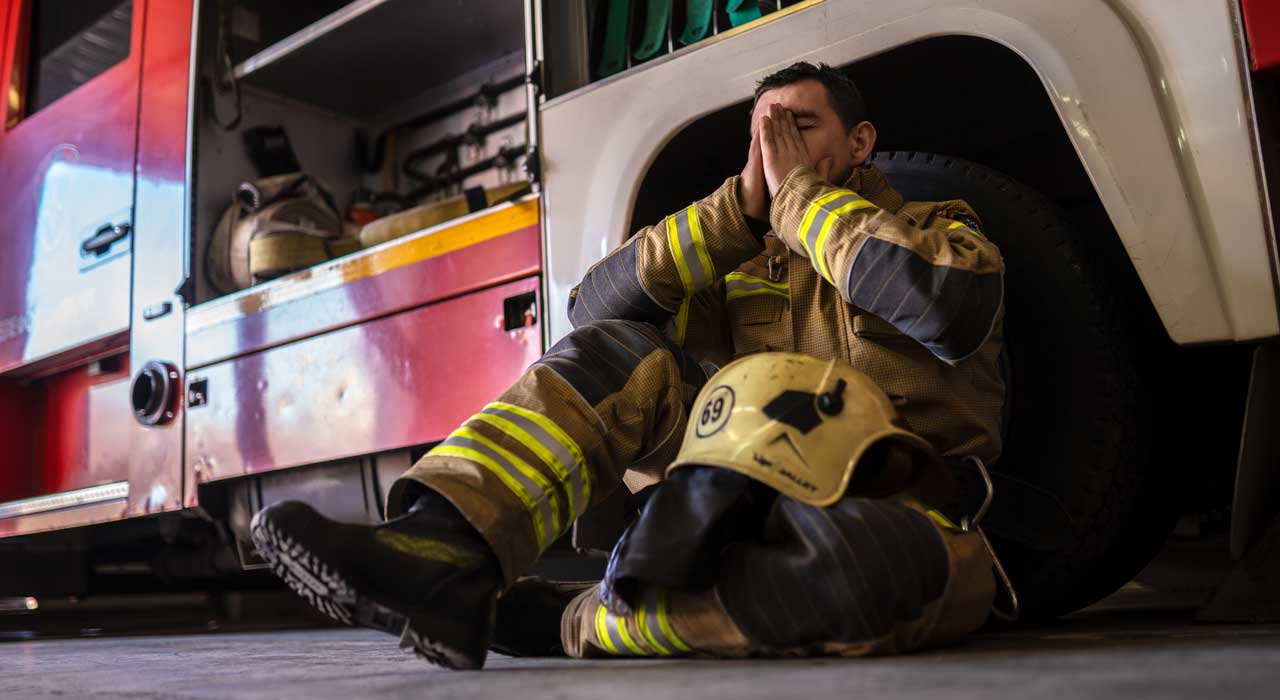First responders are the backbone of an emergency response system. They span several disciplines, but all have one thing in common – they’re the first people to get on-site when disaster strikes. However, this sort of profession isn’t for everyone. It doesn’t take a lot of imagination to realize first responders are in a constant state of anxiety, since they never know when disaster will strike. As a result addiction in first responders happens all too frequently.
For some individuals, managing their work-life and home-life is easy since they can compartmentalize. However, in the majority of cases, this just isn’t the case, even with some compartmentalization, the work spills over. The sheer amount of loss and the weight of tragedy that comes with being a first responder is not something everyone employed in this field can easily cope with. Some lose themselves in increasing amounts of alcohol (or substances) as a way of numbing the feelings they have while on duty and may need an outside assist to break harmful cycles of drinking or drugging.
Having an occasional drink isn’t anything to worry about. Many people in professions that aren’t first responders enjoy a drink now and again. However, the real problem starts when a professional starts to put their alcohol or substance use over their job. Because of the nature of work, a first responder needs to be always alert. In an emergency situation, a moment’s hesitation could cost lives.
Unfortunately, because of how unpredictable the profession is, there’s no telling when a first responder will be called out. If they engaged in drug use beforehand and ended up in an emergency, they could cause more problems than they prevented. Addiction and substance dependence are dangerous when combined with the life of a first responder. If a first responder does have alcohol or substance use problems, dealing with them should be the first thing they look at.
However, knowing that one has a problem and dealing with it can be a harrowing experience as a first responder. There are lots of barriers in the way to getting treatment. Because of the higher regard that people hold first responders in, getting help is often akin to feeling like disappointing all those people. The judgment of friends and families is another reason first responders prefer not to seek out professional advice and therapy to deal with these issues. How can a first responder seek out treatment that won’t ruin their lives and their reputations? We explore some ways in this article.

Why is Addiction So Prevalent in First Responders?
Table of Contents
A first responder is a unique human being in many ways. They have to deal with the constant levels of stress one is exposed to from being ‘on alert’ all the time. Above that, their jobs are both physically and mentally demanding. A split-second decision could mean the difference between someone living or dying.
Addiction is an insidious disease because many people who fall prey to it don’t believe that it could happen to them. As such strong and mentally secure individuals, how could addiction ever affect them? Because they are still human. Most people would put first responders on a pedestal and hold them as bastions of humanity. But they are only human and also fall prey to human desires and afflictions.
The road to addiction for most first responders starts with the stress they feel when they go out to work. With many of these professionals, compartmentalization allows them to leave the rigors of work at work. Unfortunately, this characteristic isn’t present in every single one of them.
Frequently, a first responder might start seeking out drugs or alcohol to cope with the stress of their job. That choice makes them as vulnerable to addiction as any other profession. However, the stresses and rigors that a first responder faces are far more impactful emotionally and mentally than in other occupations and can lead to deepening cycles of use and the need for outside help to ‘break the cycles’ of stress and using or drinking.
It is this combined weight of expectation and responsibility that can easily push the first responder deeper into drinking and/or substance use. It’s an escape that starts innocently enough but quickly spirals out of control. Addiction occurs when a person’s dependency drives them to make illogical or harmful decisions to acquire a substance or drink irresponsibly. Usually, when a first responder gets to this point, they must seek help. It’s hard to accept that a person needs to take care of themselves first before hoping to help others. However, it’s a necessary fact that many first responders need to come to terms with, and a core precept of the addiction treatment process.
First Responders and Post Traumatic Stress
Post-traumatic stress disorder (PTSD) is a condition that’s triggered by severe emotional trauma or life-threatening events. It’s no wonder so many first responders have PTSD because they go through life-threatening (highly stressful) situations daily. Post-traumatic stress symptoms typically show up within a month of witnessing the disturbing event that triggered them and can develop into PTSD if left unprocessed.
Canada’s Center for Suicide Prevention noted that first responders were twice as likely to commit suicide as the average individual. The fuel for this massively increased incidence of suicide can be linked to PTSD. The symptoms of PTSD fall into four broad categories, namely:
- Intrusive Memories: The victim may experience vivid memories of the event, reliving it repeatedly in their head, and being powerless to prevent it from happening. This symptom may also present as deep emotional distress when faced with people, places, or things that bring up memories of the event.
- Negativity in Mood and Self-Consideration: PTSD can have a severe impact on a person’s courage and their view of themselves. Emotional numbness is usually followed by an inability to maintain close relationships with friends and family and a loss of interest in former hobbies.
- Avoidance: Individuals who have PTSD usually avoid mentioning the event or anything that may lead to unsettling questions for them to answer.
- Reactions to Events are Different: PTSD can have strange effects on a first responder’s mental state, leading them to engage in more risky behaviors, be prone to outbursts, have trouble concentrating or sleeping, and many other things which combine to deteriorate the individual’s mood.
If developed, PTSD is a set of reactions and responses to stress stimuli that makes it much easier for addiction to take hold.

Signs of Substance Use Disorder in First Responders
How can the friends and family of a first responder spot when they’re in the grip of a substance use disorder? Most people are aware of the profession’s risks, but many don’t even consider alcoholism or addiction as a potential result. To many friends and family members, problems with alcohol or drugs can be a shocking admission for a first responder to make. Spotting signs of difficulty early can make it easier for them to open up about their problems. Among the symptoms of substance use disorder that may show up in a first responder are:
- Health Problems: Drug use can lead to severe health issues, including heart or kidney failure. First responders are usually in great shape because of what they do for a living, so health problems are a telltale sign that something isn’t quite right.
- Changes in Their Looks: Drug use typically leads to a person neglecting their appearance. If a first responder starts showing up to work with messy clothes or is not adequately outfitted, it’s a sign something’s wrong. Other visible signs are needle tracks, or in some cases, face and teeth, which may be affected by consuming some substances, like meth.
- Financial Problems: While first responders aren’t paid as much as they should be for their work, they can usually manage their expenses pretty well. If a first responder starts asking for loans from their friends or spending more money than they’re making, but there are no tangible goods to show for it, they may be engaging in drug use.
- Work Performance: First responders typically take a lot of pride in their work. However, addiction tends to replace that pride with a disdain for their job since work takes up the time they could be spending getting high. If their performance at work is way below par than what you’d expect from the individual, their attentions are likely focused elsewhere, possibly on an illicit substance.
- Loss of Interest in Social Activities: Many first responders like spending time with others. It helps them reconnect to their human side and ease the tension of dealing with stressful and life-threatening situations. Unfortunately, when a person becomes addicted to drugs, they withdraw from social life almost completely. Their social circle changes to encompass people who can get them the drugs they need. If a person starts pulling away, they may be suffering from addiction but cannot talk about it.
- Memory Loss or Frantic Energy: Some addictive substances attack the brain, leading to loss of brain volume. One of the first apparent signs of this issue is intermittent memory loss. Over time the person becomes more forgetful of things they should know about. Another behavioral sign is manic energy that a person may display, followed by periods of lethargy. A few addictive substances allow a person to get worked up but dump them after some time, resulting in slower thinking and movement.
These signs may or may not be linked to drinking or drug use, but in combination, they are a good yardstick for telling if someone might be suffering from alcohol or substance use issues that would benefit from treatment.
Addiction in Specific Professions
First responders, as we’ve already established, cover several categories. The occupation by itself doesn’t cause substance abuse, meaning that a significant number of first responders aren’t addicted to anything. However, if a person may become addicted to a substance, the profession may provide the right environment to cause that addiction to surface.
Some first responders have preferential access to narcotics and other substances that could make it easier to indulge. Others might seek out these substances as part of their job and get caught up in them before they realize what’s going on. The following professions are the ones one typically finds substance use disorder showing up in:
Law Enforcement
Police officers typically deal with a lot of stress in their professions. Dealing with dangerous criminals can lead to anxiety and make it difficult to relax when one is off-duty. The trauma they experience being first responders is similar to that of other professionals, but they are in a unique position of authority. Being so close to drugs can be tempting for someone who would typically avoid these substances altogether. However, if a person starts consuming a substance, it can quickly devolve into skimming some of the substance from raids and arrests to support their own habits.
Police officers are upstanding citizens, but the police service is a brotherhood, and many officers won’t report what they see to authorities. The culture of secrecy can be helpful for the sake of confidential information, but it can lead to increased harm if a police officer is addicted and others cover for them at work. Unlike other first responders, a police officer on mood-enhancing drugs can be dangerous, even deadly in some situations. Failure to respond quickly to a threat could lead to injuries or fatality.
Even if a police officer does realize they have a problem, they may try to hide it from the other officers because of the stigma of drug use in the service. The combination of these factors could make seeking out treatment a complicated and taxing ordeal, but certainly worthwhile if handled appropriately with the utmost privacy and attention to confidentiality throughout treatment.
EMT & Firefighters
EMTs and firefighters have to deal with harrowing experiences daily. Of the first responders, they are most often the ones in a position to see things happening and help. However, they can’t save everyone, and this fact weighs heavily on their minds. Sometimes, being so close to death in the wake of an emergency can lead to PTSD, as mentioned above.
Other times, it can lead to depression and anxiety. Guilt also plays a significant factor in substance use disorder among this class of first responders. Most people consider first responders heroes, and this qualification makes it even harder for EMTs and firefighters to admit that they have a problem and seek needed help.
The stigma attached to mental health problems and how isolating these professions can be creates a situation that could lead to severe addiction in a short space of time. Yet a lot of the time, EMTs and firefighters see addiction as a risk of the job and don’t consider it a problem before until it becomes impossible to ignore. Another barrier can be that getting help for these problems means admitting that they have an issue and dealing with it.
Fortunately, with more focus on mental health in the public eye, issues like PTSD and depression are finally getting easier to talk about. This open discussion may be the first step in helping paramedics or firefighters get the help they need to cope with addiction and dependency. If you or someone you love is a first responder who is struggling with alcohol and/or substance abuse, hopefully, this article can begin an open, honest conversation about reaching out for assistance.
Nurses and Doctors
The Journal of Nursing Management mentions that an estimated ten percent (10%) of nurses will misuse drugs in their professional lives. However, fewer nurses are victims of alcohol abuse disorder, but that’s little consolation to those professionals’ friends and families. Nurses and doctors have unique access to drugs that other professions would have to go to great lengths to get. Because these drugs are so easy to get, and it’s easy to get someone to prescribe controlled medicines, they may have substance use problems that no one notices. One of the crucial reasons substance abuse happens in these professions is the stress faced by professionals.
Traumatic experiences happen every day in the medical field. The depression that sets in after losing a patient can be intense. The combination of that stress, poor sleep quality, and PTSD may lead a person to consider taking readily available drugs as an option to cope. Unfortunately, admitting to substance use disorder can lead to many legal questions and open a professional up to litigation in some cases. The repercussions of stating that they are addicted to something are enough to keep many of these professionals quiet about their own substance use disorder or other professionals in the field.
Military and Veterans
A group of professionals that many people overlook when discussing substance use disorder are veterans and military personnel. These first responders are a crucial part of ensuring the safety of all civilians when emergencies happen. Dealing with the public requires being constantly vigilant, leading to added stress and an inability to relax. Many military personnel are discharged and go through years of therapy just to deal with their PTSD.
Unfortunately, the stereotype of veterans and heavy alcohol use can be a valid one. The Journal of Substance Abuse and Rehabilitation notes that military veterans also have higher rates of substance use than the average population. The culture of secrecy in the military is partially to blame for the high rates of substance use, but it’s not the only reason. Many military personnel keep quiet to avoid losing their friends in the service. Admitting to substance use may force the military to take drastic action and discharge the individual, reinforcing some of the detrimental effects of the culture of secrecy and making it a tough decision to reach out for help, but an important one to accomplish, safely and confidentially.

Treatment Programs Geared Towards First Responders
First responders are a group of people that need support to deal with their substance use disorders. Find Addiction Rehabs provides that support, allowing first responders to go through detox and rehabilitation in a facility that respects privacy. Many first responders travel from out of state to secure their identities while undergoing this treatment process. Some first responders can access FMLA to get time off to help them cope with their addiction, but it means admitting that they have a problem.
Even if a first responder thinks that they can manage their condition, addiction spirals out of control quickly. Getting the help you need is crucial to ensuring you overcome this problem. Let us help you leave your addiction behind you and start enjoying life again. Contact us today to find out more about our specialized treatment for first responders.
Charles F. has been an active part of the Florida recovery community for over 5 years. He began as a behavioral health technician at an addiction treatment facility in Ocala, Florida and has since begun training as a Licensed Addiction and Chemical Dependency counselor in Boca Raton. Charles’ passion involves the promotion of recovery and helping spread the hope of recovery to as many readers as possible!


